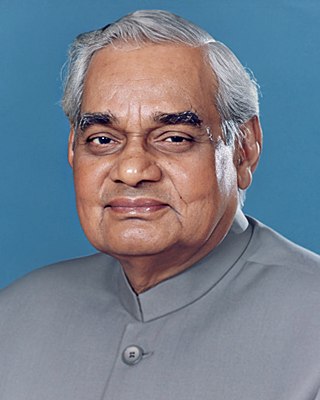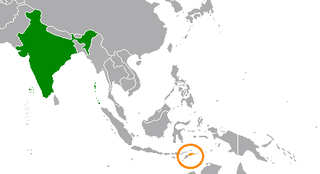India,officially the Republic of India,has full diplomatic relations with 201 states,including Palestine,the Holy See,and Niue. The Ministry of External Affairs (MEA) is the government agency responsible for the conduct of foreign relations of India. With the world's third largest military expenditure,second largest armed force,fifth largest economy by GDP nominal rates and third largest economy in terms of purchasing power parity,India is a prominent regional power and a rising superpower.

Though the Ministry of Foreign Affairs (MOFA) is the government agency which is responsible for conducting the foreign relations of Nepal,historically,it is the Office of the Prime Minister (PMO) which has exercised the authority to formulate the country's foreign policies. As a landlocked country wedged between two larger and far stronger powers,Nepal has tried to maintain good relations with both of its neighbors,People's Republic of China and Republic of India. However,the relationship between Nepal and India was significantly hampered by the 2015 Nepal blockade when the Government of Nepal accused India of mimicking "Russia-Ukraine" tactics by using ethnically Indian residents of Nepal to cause unrest along Nepal's southern border. India denied the allegation and said the unrest were an internal affair. For the most part though,Nepal has traditionally maintained a non-aligned policy and enjoys friendly relations with its neighboring countries and almost all the major countries of the world.

Atal Bihari Vajpayee was an Indian politician and poet who served three terms as the Prime Minister of India,first for a term of 13 days in 1996,then for a period of 13 months from 1998 to 1999,followed by a full term from 1999 to 2004. He was the first non-Congress prime minister to serve a full term in the office. Vajpayee was one of the co-founders and a senior leader of the Bharatiya Janata Party. He was a member of the RSS,a Hindu nationalist volunteer organisation. He was also a Hindi poet and a writer.
Sikander Bakht was an Indian politician belonging to the Bharatiya Janata Party (BJP) who served as the 15th governor of Kerala from 2002 until his death. He was elected as the Vice President of the BJP,served as its leader in the Rajya Sabha,and as a cabinet minister in the NDA government headed by Atal Bihari Vajpayee. In 2000,he was awarded Padma Vibhushan,the second highest civilian honour of the Government of India.

The Lahore Declaration was a bilateral agreement and governance treaty between India and Pakistan. The treaty was signed on 21 February 1999,at the conclusion of a historic summit in Lahore,and ratified by the parliaments of both countries the same year.

Shivshankar Menon is an Indian diplomat,who served as National Security Adviser of India under Prime Minister of India Manmohan Singh. He had previously served as the Foreign Secretary in the Ministry of External Affairs. Prior to that he was Indian High Commissioner to Pakistan,and Sri Lanka and ambassador to China and Israel. He is currently Distinguished Fellow at the Centre for Social and Economic Progress. He is also Visiting Professor of International Relations at Ashoka University.

Relations between India and the United States date back to India's independence movement and have continued well after independence from the United Kingdom in 1947. Currently,India and the United States enjoy close relations and have deepened collaboration on issues such as counterterrorism and countering Chinese influence in the Indo-Pacific.

Brajesh Chandra Mishra was an Indian diplomat from the Indian Foreign Service and politician,best known for serving as Prime Minister Atal Bihari Vajpayee's principal secretary and National Security Advisor from 1998 to 2004. He received Padma Vibhushan for his contribution

India has enjoyed close bilateral ties with the Russian Federation since the independence of India in 1947. During the Cold War,India and the USSR formed a strong and strategic relationship;this diplomatic unity was further strengthened with both nations’shared military ideals,as well as their overall economic policies. After the dissolution of the Soviet Union,Russia kept the same close ties to India;in international terms,both nations share a special relationship. Russia and India,both,consider their mutual affinity to be a "special and privileged strategic partnership". Their governments support the creation of a multipolar world order in which both nations are "poles".

India–United Kingdom relations,also known as Indian–British relations or Indo–British relations,are the international relations between the Republic of India and the United Kingdom of Great Britain and Northern Ireland. India has a high commission in London and two consulates-general in Birmingham and Edinburgh. The United Kingdom has a high commission in New Delhi and six deputy high commissions in Mumbai,Ahmedabad,Chennai,Bangalore,Hyderabad and Kolkata. Both countries are full members of the Commonwealth of Nations.

Atal Bihari Vajpayee was an Indian politician who served thrice as Prime Minister of India,first from 16 May to 1 June 1996,and then from 19 March 1998 to 22 May 2004. A member of the Bharatiya Janata Party (BJP),Vajpayee was the tenth Prime Minister. He headed the BJP-led National Democratic Alliance in the Indian Parliament,and became the first Prime Minister unaffiliated with the Indian National Congress to complete a full five-year term in office. He died at the age of 93 on Thursday 16 August 2018 at 17:05 at AIIMS,New Delhi.

Nirupama Menon Rao is a retired civil servant of 1973 batch Indian Foreign Service cadre who served as India's Foreign Secretary from 2009 to 2011,as well as being India's Ambassador to the United States,China and Sri Lanka during her career.

Bilateral relations between the India and Syria are historic where the two have ancient civilisational ties. Both countries were on the Silk Road through which civilisational exchanges took place for centuries. India has an embassy in Damascus. Syria has an embassy in New Delhi. Both countries are members of Non-Aligned Movement. Syria supports the Indian stance on the Kashmir conflict,while India supports the Syrian claim to the Golan Heights.

Raminder Singh Jassal was an Indian diplomat who served as India's Ambassador to Israel,the United States,and Turkey. He also served as India's spokesman during the 1999 Kargil War between India and Pakistan.

Subrahmanyam Jaishankar is an Indian diplomat and politician,who is the thirtieth Minister of External Affairs of the Government of India since 31 May 2019. He is a member of the Bharatiya Janata Party and has been a Member of Parliament in the Rajya Sabha since 5 July 2019. He previously served as the Foreign Secretary from January 2015 to January 2018. He is the second diplomat to be appointed India's External Affairs minister,after Natwar Singh.

The foreign policy of the Modi government,also referred to as the Modi doctrine is associated with the policy initiatives made towards other states by the current government of India after Narendra Modi assumed the office of prime minister on May 26,2014.

Neighbourhood First Policy of India is a core component of India's foreign policy. It focuses on peaceful relations and collaborative synergetic co-development with its South Asian neighbours of the Indian subcontinent encompassing a diverse range of topics,such as economics,technology,research,education,connectivity,space program,defence security,environment and climate challenge. This policy creates new avenues as well as leverages to the existing regional cooperation initiatives such as SAARC,SASEC,BBIN,and BIMSTEC. It compliments India's Look East policy focused on Southeast Asia and Look West Policy focused on Middle East.

East Timor–India relations are the international relations that exist between East Timor and India. The Embassy of India in Jakarta,Indonesia is concurrently accredited to East Timor. East Timor has no diplomatic representation in India. On 7 September 2023,India announced that it would open an embassy in Dili.
The History of Indian foreign policy refers to the foreign relations of modern India post-independence,that is the Dominion of India (from 1947 to 1950) and the Republic of India (from 1950 onwards).
Shakti Sinha was a career civil servant of the Indian Administrative Service and director of the Nehru Memorial Museum &Library.
















